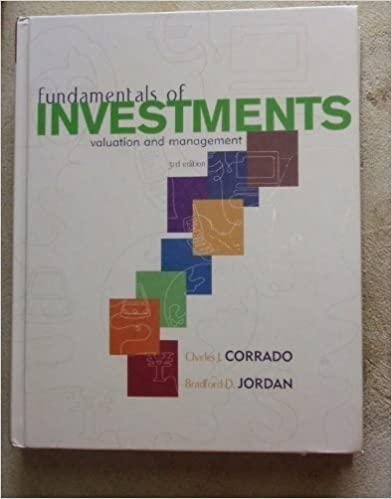Question
Question 2 Philip Photocopy (PP) operates printing services in shopping malls and universities. It is considering expanding the business and have identified two possible sites.
Question 2
Philip Photocopy (PP) operates printing services in shopping malls and universities. It is considering expanding the business and have identified two possible sites. Given PPs current circumstances, it can only afford expansion into one of the two sites.
| Proposed Sites | Cash Outflow | Estimated Cash Inflow | No. of |
| |
| Year 0 | Years 1 to 3 | Years 4 to 5 | Machines |
| |
|
|
| ||||
|
|
|
|
|
|
|
| University shop | $30,000 | $40,000 | --------- | 10 |
|
|
|
|
|
|
|
|
| City shop | $70,000 | $54,000 | $54,000 | 20 |
|
|
|
|
|
|
|
|
The university shop is located in the library of a local university. It is based on a three-year contract. The last operator only operated for three years and did not want to renew the contract due to poor demand. The city shop is in a mall where there are many tuition and enrichment centres, and near two secondary schools. The previous tenant of the city shop operated a gift shop.
- only considers capital investments with a payback period of 3 years or less. The company also assesses investments using accounting rate of return. PP bases an investments accounting rate of return on the average investment in the project. The minimum required rate of return set by PP is 12%. Average annual expenses (including depreciation) are $20,000 for university shop and $32,000 for the city shop respectively. All revenue will be received in cash in the same period; expenses other than depreciation will be paid in cash in the same period. Both projects have no residual value. The depreciation method used is the same for both accounting and tax purposes. The annual depreciation expense for each shop is $3,750 for the university shop and $8,000 for the city shop. PPs effective tax rate is 15%, and taxes are paid in the same period incurred.
Required:
- Compute the after tax net present value of each proposed shop.
(Note: PV factors for 12% are as follows: Year 1 = 0.89; Year 2 = 0.80; Year 3 = 0.71; Year 4 = 0.64; Year 5 = 0.57; the PV annuity factor for 12%, 3 years = 2.40 and 5 years = 3.61)
(8 marks)
- Calculate the payback period for each proposed shop.
(2 marks)
- Compute the expected accounting rate of return (before taxes) for each proposed shop.
(4 marks)
- PP evaluates capital investment opportunities based on payback period and accounting rate of return. Which proposed expansion option would PP select? Explain.
(6 marks)
- Given your answers from part (a) to (d), critically evaluate the capital investment evaluation techniques used by PP to come to the decision in part (d).
(7 marks)
Step by Step Solution
There are 3 Steps involved in it
Step: 1

Get Instant Access to Expert-Tailored Solutions
See step-by-step solutions with expert insights and AI powered tools for academic success
Step: 2

Step: 3

Ace Your Homework with AI
Get the answers you need in no time with our AI-driven, step-by-step assistance
Get Started


